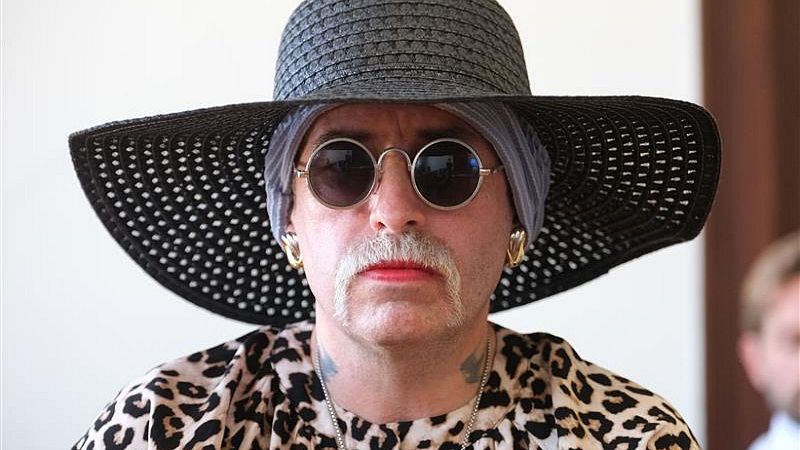'From Moscow with love': German neo-Nazi Liebich is reportedly seeking asylum in the US

An arrest warrant has been issued for neo-Nazi Marla-Svenja Liebich, formerly Sven Liebich, who failed to start a prison sentence at Chemnitz women's prison.
Liebich is reported to have fled abroad, police confirmed, claiming this had become evident from an audio recording that was played outside the women's prison. A spokesperson said around 60 supporters gathered outside the prison for a "housewarming party" planned by Liebich.
Since the escape, Liebich has been very active on social media.
"Nobody knew about my decision - no lawyer, no family," Liebich wrote on X, attaching a photo of a poster portraying Liebich in front of the St. Basil's Cathedral, with accompanying text reading "From Moscow with Love, James Bond" and the hashtag #runningwoman.
In another post, the far-right extremist again referenced Russia.
"A real advantage: even as a little girl, I went to a school with extended Russian lessons. [...] Now I realise how much of that is still deep in my head," Liebich wrote.
The neo-Nazi then announced on X that Liebich was "on the territory of the Russian Federation" and was talking to "officials close to the Kremlin."
Liebich disclosed her plan was to apply for asylum in the US from there, where "interest has been expressed," the extremist said.
Potential abuse of Germany's new 'self-declaration' law
In July 2023, Liebich, who was then still known as Sven, was sentenced to one and half years' imprisonment without parole for right-wing extremist activities, including incitement to hatred, defamation, and insult.
A year and half later, Liebich took advantage of Germany's new law, called the Self-Determination Act, which makes it easier for trans and non-binary people to have their gender entry and name changed.
Liebich then used the new self-identification to request serving the sentence in a women's facility, sparking widespread controversy. Before changing gender and first name, Liebich disrupted an LGBTQ+ pride parade in the city of Halle, and had called queer people "parasites of society".
Federal Minister of the Interior Alexander Dobrindt (CSU) accused Liebich of abusing the regulation. "The judiciary, the public and politicians are being made fools of here," he told local media. Dobrindt now wants to better protect the Self-Determination Act from abuse.
"We now need a debate on how to re-establish clear rules against the abuse of gender reassignment," he concluded.
How could such an incident even happen?
The incident sparked a whole debate about the Self-Determination Act. But how did it come about in the first place?
Since November 1, 2024, a simple declaration to the registry office has been sufficient to officially change gender and name. This is regulated by the new Self-Determination Act of the broken "traffic light coalition" (SPD, FDP, and the Greens).
The aim of the Self-Determination Act was to make it easier for transgender and non-binary people to change their gender and name. But this also made it easier to abuse the system.
This is setting the stage for another dispute within the black-red government (CDU/CSU and SPD). The Union had called for talks on "new regulations". The coalition agreement stipulated an evaluation by July 2026 at the latest. However, coalition partner SPD continues to stand by the law.
Carmen Wegge, legal policy spokesperson for the SPD parliamentary group, told ZDFheute: "With the SPD, there will be no changes to the Self-Determination Act."
Falko Drossmann, queer policy spokesperson for the SPD parliamentary group, also told Der Spiegel: "I clearly reject blanket tightening or rolling back of the law." "The Liebich case is a targeted attempt at abuse by a known right-wing extremist and not a structural problem with the Self-Determination Act,” says Drossmann.
Criticism of the Self-Determination Act
UN expert on women's rights, Reem Alsalem, warned of the dangers for women and girls when the law was passed. Women who are affected by male violence are particularly at risk, she said. Protective measures to prevent abusers from exploiting the law are simply lacking. Women's shelters, changing rooms, and shared toilets would therefore no longer be safe spaces. The federal government had rejected the criticism.
Today

